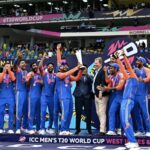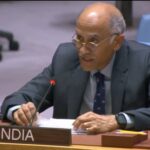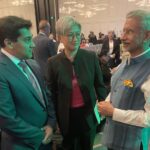Chris Martin of Coldplay is synonymous with the song “A Sky Full of Stars.” It was recorded in Sydney, New South Wales, Australia, a region that has contributed so much to the cricket world.
Yet on June 29, 2024, that name experienced a different rendition. On the balmy Caribbean Island of Barbados, there was a “Blue SKY” and ten other stars around him. Not the weather report from the Barbados Broadcast, but retelling the euphoria of the Indian cricket team, its crooning Bharath Army fans, and the feeling a billion plus ululating supporters experienced, when Surya Kumar Yadav (known by his acronymic SKY) took a “blinder” of a catch to metaphorically also catch the T20 World Cup.
I don’t need to relive the incident again, of how that catch sealed David Miller’s wicket and was the final nail in South Africa’s coffin to buff some silverware. South Africa and South African fans know all this story all too well. Like a Shakespearean tragedy, the characters may be new, and the scene changes, but the plotline remains the same – the Proteas play well in a tournament, get to a crucial knock-out stage perhaps even do well in that match, and like a Roald Dahl novel, mystery and intrigue unfurl themselves and somewhere, there is a cricketing god with a brutish sense of schadenfreude inflicted and reserved just for the Proteas team and then they capitulate like a house of cards.
Don’t take my word for it, a walk down memory lane is so brutal even for the most partisan fan rooting against the Saffers.
It’s hard to explain the moroseness, anguish, and frustration of being a Proteas fan. Let me address the elephant in the room first – I am a South African cricket fan even though I was born and raised in India. I am not South African, blimey, I haven’t even had the chance to go to South Africa, but I can sing the national anthem fluently – “Nkosi Sikelel’ iAfrika”, which is made up of verses in five languages of Xhosa, Zulu, Sesotho, Afrikaans, and English. I have devoured all of Nelson Mandela’s Gandhian learnings from his time of incarceration in Robben Island and arcane things pertaining to South African geography, such as the wineries of Stellenbosch in the Western Cape to areas in Johannesburg from salubrious Sandton and no-go zones of Hillbrow and Alexandria.
My fandom for South Africa even prompted a former British colleague of mine at ESPN STAR Sports to remark, “Mate, you’re from India, the cricket powerhouse, and support South Africa, that’s like a football fan from Brazil who decides to support Holland or something.”

It’s a fair question and a perplexing one too. Why indeed do I support South Africa? In some ways, some of the simplest questions have the most complex answers. The honest answer is, it’s something about sports and loyalty to a team. Sometimes, you don’t choose it, the side serendipitously picks you.
As a 90s child, my first introduction and love of the sport began with the 1996 Wills World Cup. I devoured every game, and my memory can recall every player who played in that World Cup across all the teams. Yes, I am dating myself a bit here.
South Africa caught my attention; call it childhood curiosity, I looked at the entire South African team and only saw Paul Adams was the only non-white player in the 14-man squad. It was a time sans Wikipedia or Google, and we were restricted to atlases, globes, and physical encyclopedias, and of course – asking the grown-up. I asked my parents, shouldn’t South Africa be majority black, so why is this an all-white team?
With a sigh, they sat down and explained what apartheid was, its origins, and ergo why South Africa was banned. Studying Indian history meant studying a lot of Mahatma Gandhi and a key part of his life was in South Africa, and Tolstoy Farm his ashram in the country, where the earliest formation of his non-violence methods and the Satyagraha campaign were ideated. It was at a train station at Pietermaritzburg when a young lawyer named Mohandas Gandhi was evicted from a first-class cabin for not being white. As Gandhi himself would write “My active non-violence began from that date.”
That began what I describe as the process when Mohandas became Mahatma. As I quip, he had a reverse Darth Vader moment. Anakin Skywalker put on a suit and became evil; Mohandas Gandhi took off his Western suit and would soon become the revered individual that the world got to know.
In the 1996 World Cup, South Africa was in imperious form but lost a quarter-final tie against the West Indies, as the Proteas selected error leaving out White Lightning Allan Donald for spinner Paul Adams on a seamers’ paradise in Karachi. A Brian Lara ton was the beginning of many more heartbreaks to come.
I learned then it all began in 1992, with South Africa’s readmission into the world of cricket after a 22-year hiatus. 22 that number would insidiously come back to haunt South Africa, in the rain-affected semi-final against England. The Proteas needed 22 runs from 13 balls when the skies began to open up. Brian McMillan and Dave Richardson were more than capable of knocking off those runs. Once play resumed, the Proteas still needed 22 runs but off just one ball to win. Such was the absurdity than the even more arcane and complex introduction of the Duckworth-Lewis rain rule came into force.
To tell you the most painful story in 1999, I will have to take you to 2008 when I was a young cub reporter, still in school, covering a now-defunct T20 tournament. I had the chance to interview one of my all-time favorite cricketers – Zulu formally known as Lance Klusener, one of the finest finishers in the modern-day game, perhaps then on par with Michael Bevan. Yuvraj Singh hadn’t made his debut then. There is something about Southpaw all-rounders, add Ravindra Jadeja and Ben Stokes to that list, too. I felt melancholic when I asked him about that fateful day in Edgbaston in 1999. I remember that day like it was yesterday. Both memorable moments and horrendous memories are etched in our subconscious minds. The juxtaposition is revealing. The 1999 ICC World Cup was Zulu’s World Cup. He could do nothing wrong with willow and leather – he had the Midas touch.
Australia and South Africa were both fighting for a place in the finals. Important caveat, Australia hadn’t begun its rise to cricketing invincibility, this event was perhaps the catalyst that spurred it on.
In the Super Six stage, the phrase “You’ve just dropped the World Cup” is etched in cricket folklore now. Herschelle Gibbs, the safest pair of hands since Jonty Rhodes, famously dropped a simple chance when attempting to flick it up in celebration. Skipper Steve Waugh, then on 56, went on to make an unbeaten 120 and guide Australia to the target of 272 in the final over. It wasn’t curtains, but it allowed Australia a vital rematch.
In the semi-final, that dreaded evening in Edgbaston, Birmingham, I remember that final over of Damien Fleming. 9 runs required off an over. I couldn’t watch it! I hid in the next room until my sibling screamed. Zulu, who had played so well, was determined to take South Africa home as he struck the first ball for four. The new equation was now just 5 off 4, and then another shot, same result. It was now 1 run off 4 balls. Just one precious run, that was it. Surely now the Proteas were home.
What would happen next is beyond incredulous! People forget the ball before the fateful ball. The penultimate ball. The scorecard reveals nothing happened, but it laid the foundations for disaster. Allan Donald, the quintessential number 11, was at the non-striker’s end. He tried to take off for a single. Darren Lehman threw the ball down and missed the stumps. Donald kissed the crease in amazement that he had survived. Perhaps, tempting a bad omen, that sadistic cricketing god was on scene. Disaster doesn’t strike easily, it is like a predator playing with its prey, giving the prey a false sense of hope before the dreaded ending.
Lance Klusener struck the ball to mid-on and scampered for a single, and Allan Donald, perhaps once bitten, was twice shy. White Lightning with the ball, but another lightning in disaster would strike twice. Donald didn’t move, and then Mark Waugh threw the ball to Damien Flemming, who would underarm the same to keeper Adam Gilchrist, who dislodged the stump. A sea of canary yellow swarm the Edgbaston turf. The mild-mannered umpire, S. Venkataraghavan, removed the bails. Donald is both in no man’s land, literally in the middle of the wicket.
Klusener dejected, then an image of a disconsolate Hansie Cronje, who would suffer a fate far worse, both in reputation and then, sadly, death. South Africa fell short, not just by the incomplete run but by history itself. There was no super over then, and Australia, by having won the Super Six against South Africa (the infamous Herschelle Gibbs dropped catch of Steve Waugh), was how South Africa did drop the World Cup. Not only would they never make another 50 over World Cup final, but this was the start of Australia’s impregnable streak of World Cup wins, one they wouldn’t relinquish for a long time. That unfortunate twist of fate cruelly meant South Africa never got to the finals, until the recent ICCWT20 final against India.
It wouldn’t end there, in 2003, as hosts of the tournament, another rain-affected game against Sri Lanka, and this time, with Duckworth Lewis too. Shaun Pollock and South Africa would erroneously miscalculate and thus seal their exit.
In 2011 and 2015, New Zealand, everyone’s second-favorite team sent South Africa packing, as the Proteas had a batting collapse in 2011, and in 2015, in Auckland, South African-born Grant Elliot would hit the winning runs, to send tears down AB De Villiers cheek and leave a dejected Dale Steyn crestfallen in the middle of the wicket.
There are too many layers and far too many tournaments to name – multiple Champions Trophy knockout stages only add to the morass. It’s no wonder, Gary Kirsten, the former South African star southpaw, who won the World Cup as a coach with India in 2011, remarked on South Africa’s choker’s tag: “You’ve got to accept that’s what it is. It’s definitely a dark mist that hangs over South African cricket in knockout events.”
Perhaps, in some form of redemption, South Africa got a win over Australia in the greatest ODI ever played in 2006. It was the first time that 400 was crossed in an ODI innings, when Australia batted first, as Ricky Ponting, Mike Hussey, and Adam Gilchrist piled on the pain. Today, those scores are not as incredulous as they were then. And what should have been enough to sink any side, let alone South Africa that clutches defeats from the jaws of victory, something miraculous happened.
South Africa would not choke, but in fact, would chase it down in emphatic style. Herschelle Gibbs, who dropped that catch in 1999, would play the innings of a lifetime with 175, followed by skipper Graeme Smith with 90 and Mark Boucher hitting the winning runs, after Makhaya Ntini, survived. So, with 9 wickets down, the series on the line, the Proteas would exorcise some of the demons of Edgbaston 1999. Funnily enough, in a case of cricket karma, it was Gibbs who had a catch dropped off his batting for him to go on to play that blinder.
Alas, it wasn’t a World Cup final, and Hansie Cronje, who was once adored by all of us in the cricket world, faced ignominy and then judgment in the skies, would have looked down on that day and smiled – South Africa was home at last.
It’s hard to explain this to a partisan Indian fan, who sees nationalism and the Indian cricket team as one and the same cause. The truth is that I am not rooting against India, but I’ve always been a cricket tragic and a sports fan first. Having been a sports journalist, covered the first-ever edition of the Indian Premier League (IPL), and later seen how cricket rights are acquired when I worked at ESPN STAR Sports, my umbrage with the BCCI is well evinced. In a la FIFA method, there is a level of authoritative dominance, like Caesar’s stronghold over Rome and BCCI’s tentacles over the sport of cricket. But more on that for another day and another op-ed.
As a cricket fan first, now more than ever, I want South Africa to win a major cricket tournament. Why? In a nutshell, it’s good for the game, it’s great for the sport, it’s South Africa’s deserved recognition, and also cheekily, I think “empires, even cricket empires” are meant to fall.
And just for once South African fans could tell posterity, “There was once a time, a long time ago, when we were called chokers.”
Disclaimer: The opinions and views expressed in this article/column are those of the author(s) and do not necessarily reflect the views or positions of South Asian Herald.






